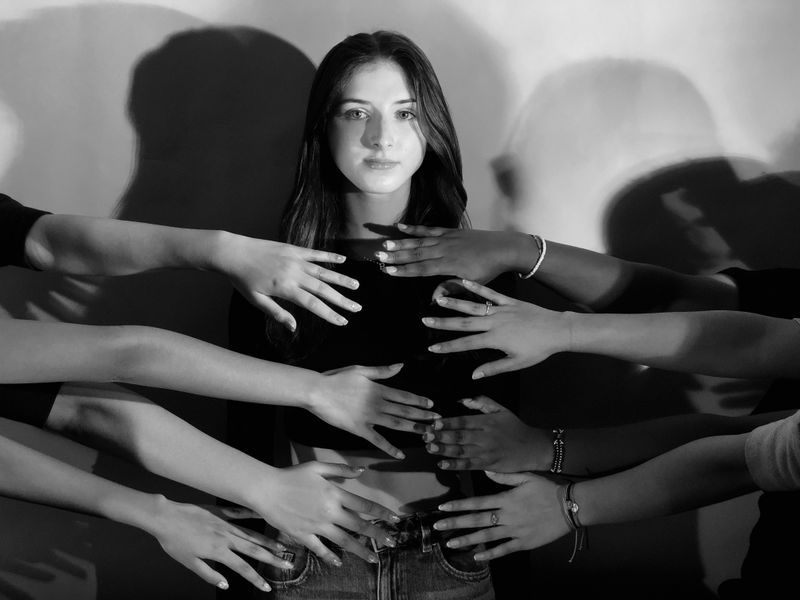We Are America
Bodies Through a Lens
By Isabella

Lowell High School, Lowell, Massachusetts
I was roughly 10 years old, in middle school, when my body started being commented on. It was always by other kids, mainly boys, but honestly a good amount of girls as well. I get that kids can be clueless and say stuff they don't really mean sometimes. I was in 5th grade when a young boy that sat beside me was scrolling through instagram. He came across this picture of a model and turned his phone towards me. “She’s hot, look at her. You wouldn’t know anything about this,” he told me, pointing to her breast, then me and laughing. I sat there frozen, my face bright red and blank. I awkwardly faked a laugh and turned away. Those words would never leave my mind. Those words haunted the reflection that looked back at me in the mirror for years. After that first comment, such comments never really seemed to stop.
I would begin to hate the way I looked because I didn't fit the instagram model standards. I wasn’t built like them. My lips weren’t plump, my eyebrows weren't perfectly shaped. I felt ugly because of the shape of my body. In reality I was just a little girl that was feeling the wrath of corrupted social beauty standards that had been plastered through social media and broadcasted to young developing kids.
I started using social media around the time I was 10. I made an instagram account and followed all of my favorite celebrities. Their pages consisted of beautiful pictures of them. I wondered how they got themselves to look so perfect. Not a single flaw in sight. Their skin perfectly clear, mine acne covered. Their bodies were slim and curvy, mine lanky, long and boxy. It seemed so unrealistic. I wanted to look like these girls. I wanted the likes, the attention, the support and the love that they all received.
In the 7th grade I had the idea of photoshopping my pictures to make myself look however I wanted. I could shape my body anyway I wanted, and that is exactly what I did. I removed all of my pimples, I removed any and all imperfections I could see. I was so excited to post these on my instagram. Once I felt like they were perfect, I posted them. My likes and comments skyrocketed. I was getting so much more attention than I did previously when I would post my natural unphotoshopped pictures.
It was a good feeling at the time. The comments were so positive and I loved receiving them. Yet after a while, that feeling was gone. The feeling of loads of likes and comments from people online no longer brought me the same joy. I continued to photoshop and post, but I was left with an empty feeling. I felt like I had let myself down. I wasn’t able to unapologetically be myself. I absolutely hated that I had done that to myself. I created this fake image of who I really was and when I looked in the real mirror, face to face, I wasn’t able to meet that image. That feeling was heart wrenching. It made me question if I was good enough.
When I was 14, I made the decision to delete the editing apps I had downloaded onto my phone, and also to delete each and every one of the edited pictures I had put out onto the internet.
I now understood that the key to happiness was not meeting other people’s standards, it was meeting my own. It was about being the best version of myself that I can be without comparing myself to other people on the internet. Social media shows young kids a false reality. It causes kids to question how they look and compare themselves to just about everybody else. This is so damaging to young minds. Social media is unrealistic. Be kind to your peers. You don’t know how negatively your comments can affect others. I push any and all kids who are feeling like they aren't pretty or handsome enough to understand that society’s current beauty standards are completely unrealistic and simply unattainable. As cliche as this sounds, you are beautiful in your own ways. Never let anybody tell you differently.
© Isabella. All rights reserved. If you are interested in quoting this story, contact the national team and we can put you in touch with the author’s teacher.